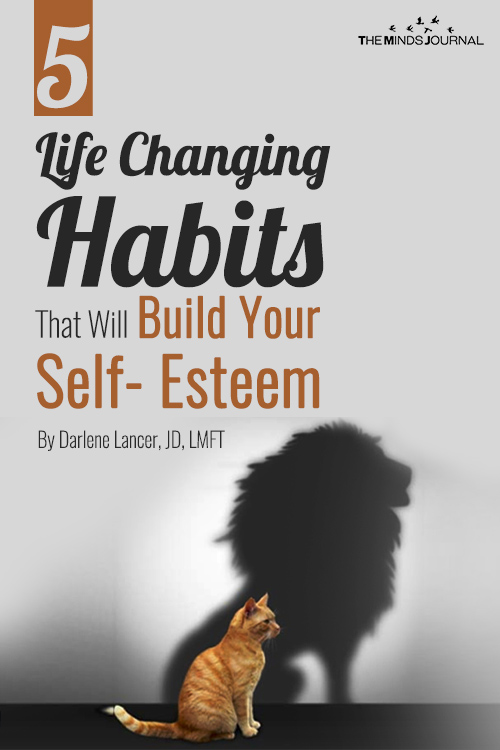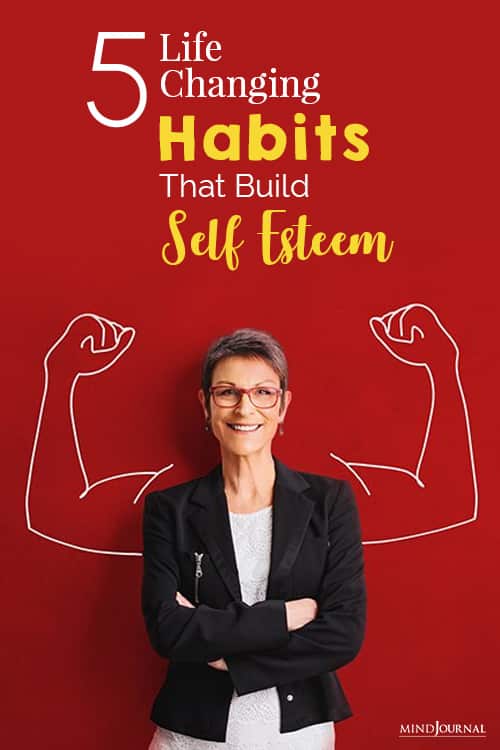Our thoughts are powerful – for better or worse. Our habits and thoughts can set off chain reactions that build self-esteem or undermine it. Authority over our minds is the ultimate power.
“Mind is everything. What you think you become,” said Buddha.
Thoughts affect not only our mental health, relationships, and the ability to achieve our goals, but also our physical health – our digestion, circulation, respiration, immunity, and nervous system.
Next, are our actions. Change begins in the mind but is manifested and amplified by our actions. How we behave can change our thoughts and feelings. They change us.
Spend 15 minutes doing the following each day, and watch your whole life change:
5 Life-Changing Habits That Will Build Your Self- Esteem
1. Mindfulness Habits
Mindfulness brings awareness to our thoughts. It’s merely the ability to observe our thinking in a dispassionate, neutral way. Research has shown that mindfulness meditation has numerous benefits, including:
- Reduced rumination
- Reduced stress
- Increased working memory
- Increased ability to focus
- Increased empathy
- Increased self-esteem and self-compassion
- Reduced reactivity
- Increased cognitive flexibility
- Increased relationship satisfaction
- Increased speed of information processing
- Other benefits. Mindfulness has been shown to enhance self-insight, morality, intuition and fear modulation, and other health and brain functioning benefits.
Shining the light of consciousness on our mental process differs from being caught up in thoughts and the stories we create and react to as if they were true. Observing thoughts tends to dissipate unhelpful, repetitive ones and helps free us from self-judgment and the need to control. Mindfulness also brings us into the present moment, in contrast to the focusing on achieving or fixing things or being lost in obsessive thoughts about other people, the past, or future. It increases our ability to question, challenge, replace, or stop our thoughts and actions. In this way, we’re better able to make constructive changes and avoid repeating past mistakes.
Related: Mindfulness Meditation For Panic Disorder Relief
Mindfulness also changes how we perceive reality so that events don’t automatically affect us and our self-concept. We develop the ability to experience reality in a non-evaluative manner and less reactive way. Because our self-worth is less dependent on external reality, we’re able to embrace our inner-self rather than relying on others for validation. There is evidence that high levels of mindfulness correlate with higher levels of self-esteem and more secure self-worth.
This skill represents a higher level of awareness and consciousness. (You can take a quiz to score your degree of mindfulness.) Like learning any skill, it takes practice. Meditation or another spiritual practice can develop mindfulness. There are many types of meditation. Some involve chanting, walking, qigong, yoga, or breathing exercises, described in more detail in Codependency for Dummies, as well as the many other mental, emotional, and physical benefits of meditation.
2. Encourage Yourself
According to research, how you speak to yourself can have a huge effect on self-esteem. Self-talk can improve or ruin your mindset, mood, relationships, and job satisfaction and performance. Self-criticism is the biggest obstacle to good self-esteem.
To overcome self-criticism, the first step is becoming conscious of your negative self-talk. Mindfulness helps, but so does writing down your negative self-talk. Start replacing the negative with positive, self-affirming statements.
Beware, however, that if you tell yourself things you don’t believe, your efforts can backfire. Your unconscious is very literal and doesn’t distinguish between what you tell yourself and what others say to you.
Related: 14 Useful Psychological Life Hacks To Get An Edge In Life
3. Make A Gratitude List

Cultivating “An attitude of gratitude” has numerous health and psychological benefits. Among them, studies show that it will:
- Increased quality sleep
- Increased time exercising
- Increased vitality and energy
- Increased physical and psychological health
- Increased empathy
- Increased self-esteem
- Increase productivity and decision-making ability
- Increased resiliency in overcoming trauma
- Reduced depression (by a whopping 35%)
Related: 7 Laws of Gratitude That Will Change Your Life
It can be hard to feel grateful when you don’t, especially when you have depression, anxiety, trauma, or physical pain.
An easy way to begin is to keep a daily journal and write 3-10 things you’re grateful for.
In doing this daily, your mind will start looking for things each day to add to your list. In this way, your outlook on life begins to change. You’ll have even greater benefits if you do this with a friend, sponsor, or your partner and read your list aloud. Here are more tips on developing gratitude.
4. Make A Plan
Not only has research shown that goal setting increases both motivation and performance, but it also enhances positive feelings and our sense of well-being, self-efficacy, success, and job satisfaction. Each day writes daily objectives. For me, it works better to do this the night before. If you have a lot on your mind that interferes with falling asleep, making a to-do list can get them off your mind.
It’s important not to abandon yourself. When you don’t feel like doing something, like paying bills or exercising, do it anyway. Larger goals require more thought and planning, but research shows that the more difficult the goal, the greater the pay-off. This makes sense since the greater achievement would build more self-confidence and self-esteem. When you have a bigger goal, break it down into small, daily, actionable steps.
Related: 12 Uncomfortable Feelings That Indicate You Are on the Right Track
5. Do Esteemable Acts
Actions count a lot. Doing things in line with your values that raises your self-esteem and elevates your mood. Conversely, doing things that make you feel ashamed or guilty undermines self-worth. Aside from living in accordance with our values, such as not lying or stealing, making an effort to do things that build self-esteem pays off. Plan to do one each day. Examples are:
- Writing a thank you note
- Sending birthday cards
- Calling a sick friend
- Cleaning out a closet
- Staying on top of filing, bill-paying, etc. (not procrastinating)
- Volunteering to help someone or a group
- Setting a boundary
- Speaking up about your wants and needs
- Showing appreciation to others
- Apologizing when you’re wrong
- Making a special meal
- Self-care, including keeping medical appointments
All this may sound like too much and too time-consuming, but mediating a mere 10 minutes a day develops a healthy habit. It can take less than 5 minutes to write goals for the day, a grateful list, and negative and positive self-talk. At the end of the day, you can write three things you did well, and feel grateful and proud. Go to sleep with a smile, knowing that you improved yourself and your life.
For more please refer to – https://www.youtube.com/watch?v=FeLpvgAVtU8&t=9s
©Darlene Lancer 2017
Written by Darlene Lancer JD, MFT Originally appeared on WhatIsCodependency.com Republished with permission.












Leave a Reply